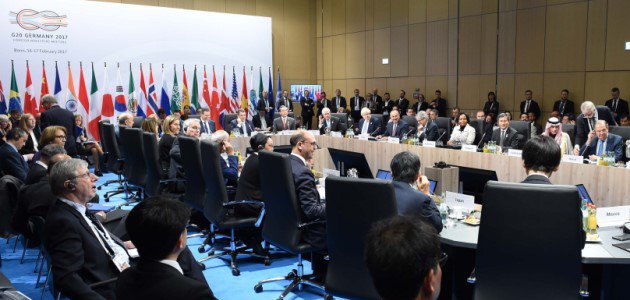Germany holds the G20 presidency in 2017. In early February, the Federal Academy for Security Policy, in cooperation with the Federal Ministry of Finance, conducted an expert meeting on the future prospects for this forum of the 20 largest industrial and emerging countries.

The G20 is a forum for international cooperation on financial and economic issues; however, security policy matters also play a role. This photo shows the G20 meeting of foreign ministers in Bonn on 16 February.
Picture: GovernmentZA/flickr/CC BY-ND 2.0
In parallel with this year’s German G20 presidency, the Federal Academy for Security Policy and the Federal Ministry of Finance conducted an expert meeting under the heading ‘The G20 as a Global Governance Institution’ in early February. Under Chatham House Rules, the experts discussed the development prospects for this forum of the 20 largest industrial and emerging countries. They focussed on the G20’s composition and abilities to represent, as well as its effectiveness in the area of security policy, including the institutional set-up and processes of the G20.
Between controversy...
The debate displayed a broad range of opinions. Some participants criticised the inconsistencies resulting from the exclusive and informal character of the G20 format. The issues discussed were very diverse – depending on the perspective of the observer – including the disproportionate share of industrial countries, as well as the mere guest status of prosperous economies such as the Netherlands and Norway. Other experts opined that the G20 had an efficiency problem which, according to them, was due to the G20’s constant change between crisis and control modus and the fact that it still had to find its place within the framework of international governance.

The reef knot is the official symbol of the German G20 presidency. This year’s Summit of the Heads of State and Government will take place in Hamburg from 7 to 8 July.
Photo: German Federal Government.
...and consensus
At the same time, there was consensus on the fact that formal institutions can rarely keep up with international problems. Dr Karl-Heinz Kamp, President of the Federal Academy for Security Policy, stressed the particular relevance of identifying suitable international control mechanisms in view of the diverse global challenges – including geopolitical conflicts, increasing migration and terrorism.
In fact, several participants in the discussion considered the flexibility of the G20 format to be advantageous when dealing with security issues. In his conference paper, Professor John Kirton, member of the G20 Research Group at the University of Toronto, pointed to a number of recent G20 decisions ranging from the fight against terrorism financing to informal mediation in current conflicts, including the territorial disputes in the South China Sea and the border dispute between China and India.
Dr Ludger Schuknecht, Chief Economist and Head of the Directorate General Fiscal Policy and International Financial and Monetary Policy at the German Ministry of Finance, concluded the meeting with a briefing on the challenges and solutions of global governance in the finance sector. He described the important role of a resilient financial and economic system in the current G20 debates, which above all highlighted the close connection between security and finance policy.
Author: Thomas Ramsauer
